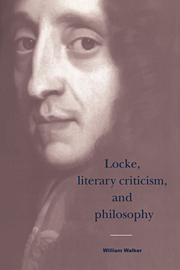Book contents
- Frontmatter
- Contents
- Preface
- Acknowledgements
- Note on the text
- Part I Introduction
- Part II Mind
- 2 Substance, space, labor, and property
- 3 Acquaintance
- 4 Seeing and touching
- 5 Force
- Part III Trope
- Part IV Conclusion
- Appendix
- Select bibliography
- Index
- Cambridge Studies in Eighteenth-Century English Literature and Thought
2 - Substance, space, labor, and property
Published online by Cambridge University Press: 23 November 2009
- Frontmatter
- Contents
- Preface
- Acknowledgements
- Note on the text
- Part I Introduction
- Part II Mind
- 2 Substance, space, labor, and property
- 3 Acquaintance
- 4 Seeing and touching
- 5 Force
- Part III Trope
- Part IV Conclusion
- Appendix
- Select bibliography
- Index
- Cambridge Studies in Eighteenth-Century English Literature and Thought
Summary
– He pick'd up an opinion, Sir, as a man in a state of nature picks up an apple. – It becomes his own, – and if he is a man of spirit, he would lose his life rather than give it up. –
Sterne, Tristram Shandy III, 34The philosophical commentary on Locke is marked by the accusation that he invests too deeply in and infers too much from the analogy between the mind and a tabula rasa. This accusation is observable in Locke's earliest opponents such as Leibniz, through Thomas Reid and Dugald Stewart in the latter eighteenth century and T. H. Green in the nineteenth century, up to twentieth-century figures such as Wilfred Sellars, Jonathan Bennett, and Richard Rorty. As will be observed later in the consideration of Locke's ostensible description of mind in terms of seeing, the claim that Locke asserts an analogy between at least one dimension of the mind and an impressed substance is not entirely mistaken. What this tradition has failed to observe, however, is that the expression tabula rasa does not occur in the Essay – rasa tabula occurs once in “Draft A” of the Essay (1671), but not in the Essay itself. This is simply the boldest indication that, within some polemical contexts of the Essay, the tabula rasa is consistently displaced by other things to figure the mind. In order to see that this is the case, Locke's representation of mind must be observed not only when describing the mind is his principal and explicit concern, but also when a description of mind is required by but secondary to his other arguments and concerns.
- Type
- Chapter
- Information
- Locke, Literary Criticism, and Philosophy , pp. 31 - 54Publisher: Cambridge University PressPrint publication year: 1994

